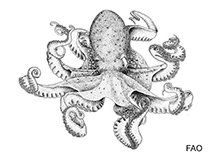Thaumeledone brevis (Hoyle, 1885)
| Native range | All suitable habitat | Point map | Year 2050 |

|
| This map was computer-generated and has not yet been reviewed. |
| Thaumeledone brevis AquaMaps Data sources: GBIF OBIS |
Google image | No image available for this species;
drawing shows typical species in Octopodidae.
Classification / Names Tên thường gặp | Các synonym ( Các tên trùng) | CoL | ITIS | WoRMS
Cephalopoda | Octopoda | Octopodidae | Graneledoninae
Environment: milieu / climate zone / Mức độ sâu / distribution range Sinh thái học
; Mức độ sâu 200 - 5000 m (Tài liệu tham khảo 3107). Tropical
Distribution Các nước | Các khu vực của FAO | Các hệ sinh thái | Những lần xuất hiện | Những chỉ dẫn
Southwest Atlantic: Uruguay.
Length at first maturity / Bộ gần gũi / Weight / Age
Chín muồi sinh dục: Lm ? range ? - ? cm Max length : 2.0 cm ML con đực/không giới tính; (Tài liệu tham khảo 96968)
Life cycle and mating behavior Chín muồi sinh dục | Sự tái sinh sản | Đẻ trứng | Eggs | Sự sinh sản | Larvae
Main reference
Các tài liệu tham khảo | Người điều phối | Người cộng tác
Scarabino, F. 2003 Lista sistemática de los Cephalopoda vivientes de Uruguay. Communicaciones de la Sociedad Malacológica del Uruguay 8(78-79):197-202. (Tài liệu tham khảo 3107)
IUCN Red List Status
(Tài liệu tham khảo 130435: Version 2025-1)
CITES status (Tài liệu tham khảo 108899)
CMS (Tài liệu tham khảo 116361)
Threat to humans
Human uses
| FishSource |
Các công cụ
Thêm thông tin
Thành phần thức ăn
Thành phần thức ăn
Các động vật ăn mồi
Max. ages / sizes
Length-weight rel.
Length-length rel.
Length-frequencies
Mass conversion
Sự phong phú
Các nguồn internet
BHL | BOLD Systems | CISTI | DiscoverLife | FAO(Publication : search) | Fishipedia | GenBank (genome, nucleotide) | GloBI | Gomexsi | Google Books | Google Scholar | Google | PubMed | Cây Đời sống | Wikipedia (Go, tìm) | Tạp chí Zoological Record



